初中非谓语动词最全总结
初中英语语法非谓语动词

It is good of you to help me with my English. 你真好,帮助我学英语。 (强调you的特征=You are good to help me.) It is good for you to give up smoking. 戒烟对你有好处。 (强调的是give up smoking这一行为= For you to give up smoking is good.)
F、作定语(必须后置)
I have something to say . It’s the best way to help him .
1、had better 后 2、使让动词 make , let , have 用于主动语态时。 3、感官动词see, hear , watch , feel , notice 用在 “经常”的主动语态时。
Looking at a crowded street Listening to my own heart beat So many people all around the world Tell me where do I find someone like you girl Take me to your heart take me to your soul Give me your hand before I’m old Show me what love is - haven’t got a clue Show me that wonders can be true They say nothing lasts forever We’re only here today Love is now or never Bring me far away Take me to your heart take me to your soul Give me your hand and hold me Show me what love is - be my guiding star It’s easy take me to your heart Standing on a mountain high Looking at the moon through a clear blue sky I should go and see some friends But they don’t really comprehend Don’t need too much talking without saying anything All I need is someone who makes me wanna sing
初中英语非谓语动词完整归纳
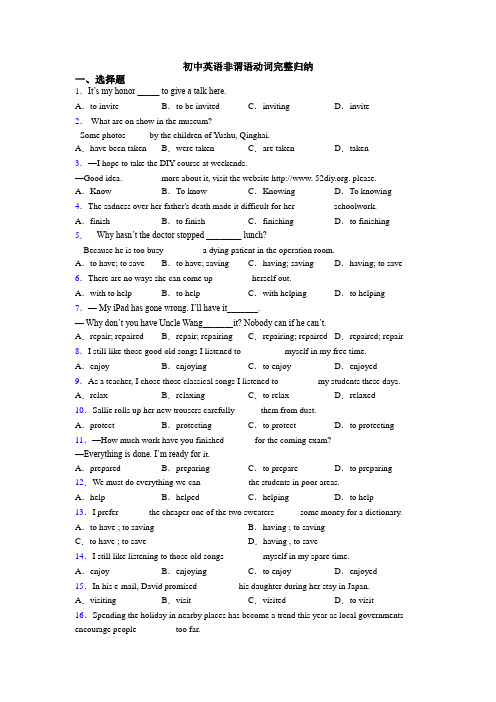
初中英语非谓语动词完整归纳一、选择题1.It’s my honor _____ to give a talk here.A.to invite B.to be invited C.inviting D.invite2.-What are on show in the museum?-Some photos _____by the children of Yushu, Qinghai.A.have been taken B.were taken C.are taken D.taken3.—I hope to take the DIY course at weekends.—Good idea. ________ more about it, visit the website http://www. . please. A.Know B.To know C.Knowing D.To knowing 4.The sadness over her father's death made it difficult for her ________ schoolwork. A.finish B.to finish C.finishing D.to finishing 5.---Why hasn’t the doctor stopped ________ lunch?---Because he is too busy ________ a dying patient in the operation room.A.to have; to save B.to have; saving C.having; saving D.having; to save 6.There are no ways she can come up ________ herself out.A.with to help B.to help C.with helping D.to helping 7.—My iPad has gone wrong. I’ll have it_______.—Why don’t you have Uncle Wang_______it? Nobody can if he can’t.A.repair; repaired B.repair; repairing C.repairing; repaired D.repaired; repair 8.I still like those good old songs I listened to _________ myself in my free time. A.enjoy B.enjoying C.to enjoy D.enjoyed 9.As a teacher, I chose those classical songs I listened to ________ my students these days. A.relax B.relaxing C.to relax D.relaxed 10.Sallie rolls up her new trousers carefully _____ them from dust.A.protect B.protecting C.to protect D.to protecting 11.—How much work have you finished ______ for the coming exam?—Everything is done. I’m ready for it.A.prepared B.preparing C.to prepare D.to preparing 12.We must do everything we can __________ the students in poor areas.A.help B.helped C.helping D.to help13.I prefer ______ the cheaper one of the two sweaters _____ some money for a dictionary. A.to have ; to saving B.having ; to savingC.to have ; to save D.having , to save14.I still like listening to those old songs ________ myself in my spare time.A.enjoy B.enjoying C.to enjoy D.enjoyed 15.In his e-mail, David promised _________his daughter during her stay in Japan. A.visiting B.visit C.visited D.to visit 16.Spending the holiday in nearby places has become a trend this year as local governments encourage people ________ too far.A.travelling B.not travelling C.travel D.not to travel 17.She couldn’t wait ________ her mother the good news.A.to tell B.telling C.to talk D.talking18.–Your robot has caught a virus and it no longer works properly.–Wow, ______ mess it has made! I really don’t know _______ to do with it.A.what, how B.how, how C.what a, what D.how, what 19.Mr. Zhou is good at cooking and he has decided______his own restaurant.A.open B.opened C.to open D.opening 20.How much work have they finished ________ for the welcome party?A.prepared B.to prepare C.preparing D.to be prepared 21.Dan shows an interest in musical instruments and is often heard _____ the guitar. A.play B.played C.playing D.to play 22.(2017届山东省滨州市滨城区九年级第二次模拟)David enjoys ____ music at weekends, but I prefer ________ for a picnic.A.listening to;go out B.listening to;to go outC.to listen to;to go out D.listen to;going out23.Helen was made the task in two days.A.finish B.to finishing C.finished D.to finish 24.一Have you got the tickets for the concert?一Not yet,I didn't realize difficult it was the tickets.A.what; to get B.what; getting C.how; to get D.how; getting25.The old couple often take a walk after supper in the park with their pet dog ___________ them.A.to follow B.following C.followed D.follows 26.Mrs. White showed her student some old maps ________from the library.A.to borrow B.to be borrowed C.borrowed D.borrowing 27.—Mr Black, my computer is broken, it needs ________.—OK, I will have it ________ tomorrow.A.to be mended; mending B.mending; to mendC.mending; mended D.to mend; to be mended28.It took us one week ________ this article ________ by Mo Yan.A.read, written B.to read, written C.reading, to write D.to read, to write 29.—What are on show in the library?— Some photos ________ on the Great Wall.A.are taken B.taken C.are taking D.were taken 30.More TV programs, according to government officials, will be produced _____ people’s attention over food safety.A.to raise B.raising C.to rise D.rising 31.Many students admitted ________ games once in a while when they took online courses. A.play B.played C.playing D.to play32.While I ____on the street, I found a little boy ______ near the park.A.am walking, crying B.was walking, cry C.was walking, crying D.walked, cry 33.I saw her flowers in the garden when I passed by.A.to water B.water C.watering D.watered34._________ with Huawei and Xiaomi, Apple seems to have lost its attraction in the past few months.A.Comparing B.Compared C.Connecting D.Connected 35.Snakes don’t have ears but they can feel things ________.A.moving B.move C.moved D.to move 36.—How do you feel about people who keep you ____?—They drive me ____.A.wait; excited B.to wait; fun C.waiting; mad D.waiting; happy 37.-Look! So many people are walking into the museum. What are on show?-Some 3D pictures by some modern artists.A.draws B.drew C.drawn D.drawing38.When I got back home I saw a note on the door ____ “Sorry to miss you; will call later.”A.say B.says C.to say D.saying39.—Your hair is too long.—Haha. I just want to have my hair ______this afternoon.A.to cut B.cutting C.cut D.cuting40.________ by green trees and lovely animals, the visitors to Cherry Trees Farm were quite relaxed.A.Surrounded B.Surround C.Surrounding D.To surround 41.If you want to make yourself ______, you should speak clearly and slowly.A.to understand B.understood C.understand D.understanding 42.—What terrible weather!I simply can’t get the car________.—Why not try________the engine with some hot water?A.started; filling B.to start; filling C.started; to fill D.to start; to fill 43.Your hair is too long. You’d better _____.A.have it cut B.have cut it C.be cutting it D.to cut it 44.People who run towards their dreams prefer _______ the failure rather than _______ their dream.A.experiencing; to give up B.to experience; give up C.experiencing; giving up D.to experience; to give up45.People are advised to avoid ________ their eyes, nose, and mouth with unwashed hands. A.touch B.touched C.to touch D.touching 46.When I was young I liked to listen to the radio, ________ for my favourite song.A.wait B.waited C.waiting D.so that wait 47.Nowadays students have more time to practice ________ English after class.A.speak B.spoke C.speaking D.to speak48.David practices________ the piano hard and often gives wonderful performances.A.play B.played C.playing D.to play49.All of us should know what attention should be paid to __________ a more beautiful Huai'an. A.building B.to build C.build D.have built 50.—How much do you know "996" schedule?—Well, it means _____________from 9 am to 9 pm, six days a week.A.working B.worked C.to work D.works51.—Do you have any plans for the holiday?—Yes, I’m planning to travel to Jiuzhaigou. I’m looking forward to ________ the colourful lakes and amazing waterfalls.A.see B.seeing C.sees D.saw52.一Waiter! I'd like some beef and a vegetable salad.一Sorry,madam. They only for lunch. Why not consider something else? A.served; to order B.served; orderingC.are served; ordering D.are served; to order53.I think his advice is of great . It's well worth .A.value, taking B.value, to takeC.valuable, to take D.valuable, taking54.I like because it makes us know ourselves better and know more about the world. A.reading B.cooking C.swimming D.dancing55.Tom’s decided to devote all he could ________ his English before going abroad.A.to improving B.have improvedC.to improve D.improve56.Peter enjoys ________ pictures in the country on Sundays.A.draw B.drawing C.to draw D.drew 57.WeChat has given up ________ in a popular emoji (表情) recently. The “soldier face” emoji doesn’t have a cigarette in his mouth anymore.A.smokes B.smoked C.to smoke D.smoking 58.Nowadays, teachers ought to consider ________ more time on teaching research.A.spend B.to spend C.spending D.spent59._______ up sales, many international companies plan to set up online shops.A.Push B.To push C.Pushing D.Having pushed 60.—Mum, my computer doesn’t work. It needs_________ .—OK. I will have it _________.A.repairing; repaired B.to repair; repairC.be repaired; repairing D.being repaired; to repair【参考答案】一、选择题1.B解析:B句意:我很荣幸被邀请在这里演讲。
初中英语语法之非谓语动词

初中英语语法之非谓语动词1.定义:动词除在句子中作谓语以外,还具有名词、形容词及副词的性质,在句中可作主语、表语、宾语、定语、状语和补语等,这就是动词的非谓语动词。
可分为三种:动词不定式、分词和动名词。
2.动词不定式:to + 动词原形。
1)一般式:主动语态:to do ,被动语态:to be + 动词过去分词2)进行式:主动语态:to be doing ,被动语态:无3)完成式:主动语态:to have +动词过去分词,被动语态:to have been +动词过去分词4)用法:A. 作主语:To learn a foreign language is not easy . = It’s not easy to learn a foreign language .B. 作表语:The most important thing is to finish the workon time .C. 作宾语:a. 动词+to do . He decided to buy a new watch .b. 动词+疑问词+to do I don’t k now where to put thebike .c. 动词+形式宾语+宾补+to do I find it important to learna second foreign language .D. 作补语:a. 动词+宾语+to do Tom asked me to show him the new shoes .b. 动词+宾语+不带to的动词He often saw Tom play football .E. 作状语:a. 表示目的:He went to Guangzhou to see his sons . He got up early in order to catch the first bus .b. 表示结果:He is too tired to walk any farther . They aren’t old enough to go to school .c. 表示原因:He is sorry to hear that . I am glad to see you .F.作定语:I have something to tell you . I want to buy something to eat .5)动词不定式to 的省略:A. 在感官动词feel,hear,see,watch,notice 及使役动词have,let,make等后面要省to,但在变被动语态时要还原不定式to.I often saw him go out of the room .——He was often seen to go out of the room by me .B.在had better,would rather,do nothing but等后面常省to.6)动词不定式的否定形式:not + to do ,有时也可以用-never + to do 结构。
初中英语非谓语动词的用法总结
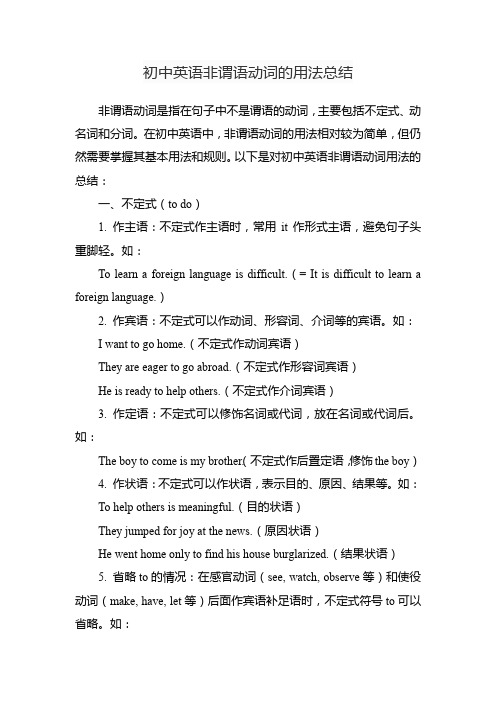
初中英语非谓语动词的用法总结非谓语动词是指在句子中不是谓语的动词,主要包括不定式、动名词和分词。
在初中英语中,非谓语动词的用法相对较为简单,但仍然需要掌握其基本用法和规则。
以下是对初中英语非谓语动词用法的总结:一、不定式(to do)1. 作主语:不定式作主语时,常用it作形式主语,避免句子头重脚轻。
如:To learn a foreign language is difficult.(= It is difficult to learn a foreign language.)2. 作宾语:不定式可以作动词、形容词、介词等的宾语。
如:I want to go home.(不定式作动词宾语)They are eager to go abroad.(不定式作形容词宾语)He is ready to help others.(不定式作介词宾语)3. 作定语:不定式可以修饰名词或代词,放在名词或代词后。
如:The boy to come is my brother.(不定式作后置定语,修饰the boy)4. 作状语:不定式可以作状语,表示目的、原因、结果等。
如:To help others is meaningful.(目的状语)They jumped for joy at the news.(原因状语)He went home only to find his house burglarized.(结果状语)5. 省略to的情况:在感官动词(see, watch, observe等)和使役动词(make, have, let等)后面作宾语补足语时,不定式符号to可以省略。
如:Let’s have him come to the party.(感官动词+不定式省略to)They had me go there.(使役动词+不定式省略to)二、动名词(doing)1. 作主语:动名词作主语时,可以直接用动名词形式,也可以用“名词+动名词”的形式。
初中英语知识点归纳非谓语动词的种类和用法
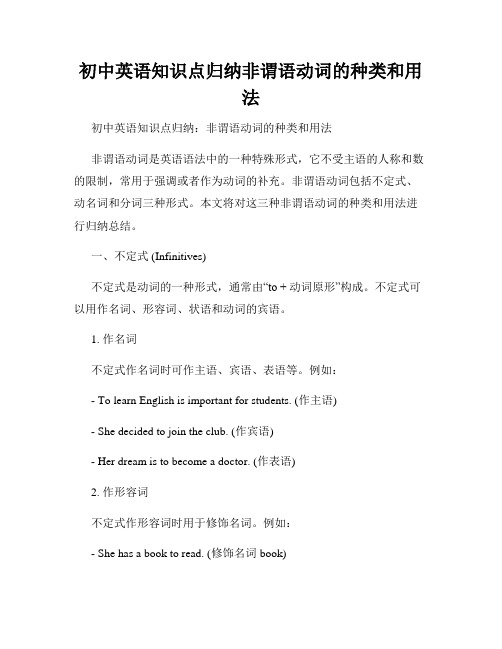
初中英语知识点归纳非谓语动词的种类和用法初中英语知识点归纳:非谓语动词的种类和用法非谓语动词是英语语法中的一种特殊形式,它不受主语的人称和数的限制,常用于强调或者作为动词的补充。
非谓语动词包括不定式、动名词和分词三种形式。
本文将对这三种非谓语动词的种类和用法进行归纳总结。
一、不定式 (Infinitives)不定式是动词的一种形式,通常由“to + 动词原形”构成。
不定式可以用作名词、形容词、状语和动词的宾语。
1. 作名词不定式作名词时可作主语、宾语、表语等。
例如:- To learn English is important for students. (作主语)- She decided to join the club. (作宾语)- Her dream is to become a doctor. (作表语)2. 作形容词不定式作形容词时用于修饰名词。
例如:- She has a book to read. (修饰名词book)不定式作状语时可以表示目的、结果、原因、条件等。
例如:- He went to the park to play basketball. (表示目的)- She studies hard to get good grades. (表示结果)- We woke up early to catch the train. (表示原因)- I need your help to finish the project. (表示条件)4. 作动词的宾语不定式可以作为动词的宾语,常见的动词有want, hope, like, love, hate等。
例如:- She wants to be a teacher when she grows up.- They hope to visit China next year.二、动名词 (Gerunds)动名词是以-ing结尾的动词形式,它可以作主语、宾语、表语、定语或者状语。
初中英语之非谓语动词知识点

初中英语之非谓语动词知识点一、非谓语动词的含义非谓语动词首先是一种动词形式,其次是这种动词形式不能做谓语,综合这两点,我们将其叫做非谓语动词。
二、非谓语动词的形式非谓语动词包含四种形式,即不定式、动名词、现在分词和过去分词。
其中,每种形式按照发生时间和主被动又包括不同的子形式。
具体如下:1. 不定式①基本形式:to do(表示主动,并且一般表示将来)②被动式:to be done(表示被动,并且一般表示将来)③进行式:to be doing (表示主动和进行)④完成时:to have done(表示主动和完成)⑤完成被动式:to have been done(表示被动和完成)⑥完成进行式:to have been doing(表示主动和完成进行)例如:The teacher told us to do morning exercises.老师让我们做早操。
The car to be bought is for his sister.要买的这辆车是给他的姐姐的。
She pretended to be reading when the teacher came into theclassroom.老师进来时,她假装正在读书。
The thief is said to have escaped.据说小偷已经逃跑了。
The thief is said to have been arrested.据说小偷已经被抓住了。
She is said to have been working in the factory over the last 20 years.据说在过去的20年里,她一直在这家工厂工作。
2. 动名词①基本形式:doing(表示主动)②被动式:being done(表示被动)③完成式:having done(表示主动和完成)④完成被动式:having been done(表示被动和完成)例如:Travelling in space by ordinary people will be common in the future.在未来,普通人在太空旅行将会是普遍的事情。
初中非谓语动词总结
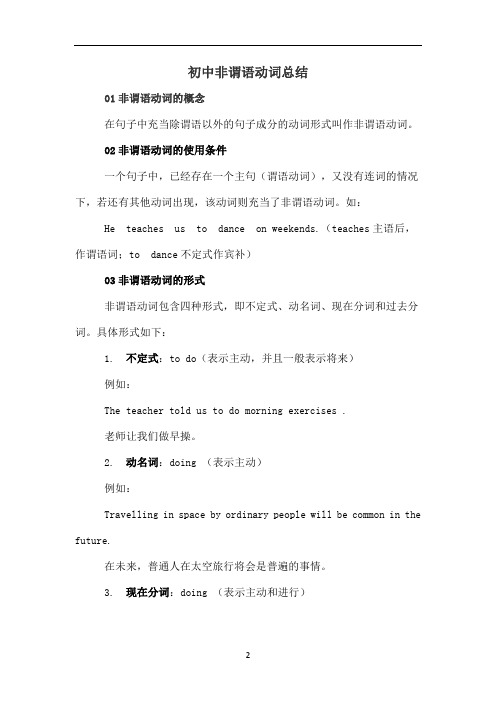
初中非谓语动词总结01非谓语动词的概念在句子中充当除谓语以外的句子成分的动词形式叫作非谓语动词。
02非谓语动词的使用条件一个句子中,已经存在一个主句(谓语动词),又没有连词的情况下,若还有其他动词出现,该动词则充当了非谓语动词。
如:He teaches us to dance on weekends.(teaches主语后,作谓语词;to dance不定式作宾补)03非谓语动词的形式非谓语动词包含四种形式,即不定式、动名词、现在分词和过去分词。
具体形式如下:1. 不定式:to do(表示主动,并且一般表示将来)例如:The teacher told us to do morning exercises .老师让我们做早操。
2. 动名词:doing (表示主动)例如:Travelling in space by ordinary people will be common in the future.在未来,普通人在太空旅行将会是普遍的事情。
3. 现在分词:doing (表示主动和进行)例如:He sat there,reading a newspaper.他坐在那里,读着一张报纸。
4. 过去分词:done及物动词的过去分词表示被动或完成;不及物动词的过去分词表示主动或完成。
polluted river 被污染的河流(及物动词pollute和river之间是被动关系,即“河流被污染”)fallen leaves 落叶(不及物动词fall和leaves之间是主动关系,即“叶子落下来”)注意:非谓语动词本身不能表示现在和过去。
非谓语动词表示进行和将来是相对于谓语动作来说的:和谓语动作同时发生表示进行;发生在谓语动作之后表示将来04非谓语动词的作用非谓语动词除去不能做谓语之外,其它所有成分都可以做。
具体如下。
动词不定式一、特点:1. 没有人称和数的变化2. 可以有自己的宾语和状语3. 有时态和语态的变化(被动语态形式为to be+动词的过去分词)二、句法作用:做主语、宾语、表语、定语、状语和补语。
初中英语知识归纳总结——非谓语动词

初中英语知识归纳总结——非谓语动词非谓语动词(一)教学重点动词不定式在英语中,不充当句子谓语的动词,叫作非谓语动词。
由于非谓语动词不受主语的限制,没有时态和语态,所以又叫非限定动词。
非限定动词有三种形式:动词不定式;动名词和分词。
1、动词不定式(1)动词不定式的构成和性质动词不定式是一种非谓语动词,所谓非谓语动词就是不能作谓语的动词。
正因为如此,它不受主语的人称和数的限制,没有人称和数的变化,但它具有动词的某些特征,可以带宾语和状语构成不定式短语。
其构成是:“to + 动词原形”,否定式是“not to +动词原形”。
to是不定式符号,无词义。
(2)动词不定式的用法动词不定式除了不能作谓语外,可以作主语、表语、宾语、宾语补足语、定语和状语。
①作主语To learn English well is not easy.To drive fast is quite dangerous.不定式作主语时常常用it作形式主语,不定式放在谓语之后以上两个例句可以写成:It is not easy to learn English well.It is quite dangerous to drive fast.这种用法可以归纳成这样一个句型:It is (not) + 形容词+ (for sb.) to do sth.It is very expensive for me to buy a car.It is very difficult for a child to do that job.有些形容词之后跟of + 名词(代词宾语)+不定式。
如:It is very kind of you to say so.It is very good of you to come.②作表语。
如:My job is to teach English.The first thing is to ring him up.③作宾语。
初中英语语法非谓语动词总结

初中英语语法非谓语动词总结非谓语动词主要包括不定式、动名词和现在分词。
为了区分这三种不同的非谓语动词的用法和含义,我们将分别从三种非谓语动词在句子中做主语、宾语、宾语补足语、定语、状语、表语以及一些特殊构造句型等角度来区分其用法和细微含义。
1.不定式和动名词作主语的区别(1)动名词作主语通常表示抽象动作;而不定式作主语表示具体动作。
Smokingisprohibited(制止)here.这里制止抽烟。
(抽象)Itisnotverygoodforyoutosmokesomuch.你抽这么多烟对你身体很不好。
(具体)(2)动名词作主语时,通常用以表示一件的事或经历。
不定式短语通常用来表示一件未完成的事或目的。
Climbingmountainsisinteresting.爬山很有趣。
(经历)Drivingacarduringtherushhouristiring.在顶峰时刻开车令人厌烦。
(经历)(3〕不定式做主语,一般用it当形式主语,把作主语的不定式短语后置。
Ittookmeonlyfiveminutestofinishthejob.2.不定式、动名词和分词作表语的区别(1)不定式作表语1)不定式作表语一般表示具体动作,特别是表示将来的动作。
Todotwothingsatatimeistodoneither.--次做两件事等于未做。
WhatIwouldsuggestistostartworkatonce我.的建议是立刻开场干。
2〕如果主语是不定式〔表示条件〕,表语也是不定式〔表示结果〕。
Toseeistobelieve百.闻不如一见。
Toworkmeanstoearnaliving.工作就是为了生活。
3)如果主语是以aim,duty,hope,idea,happiness,job,plan,problem,purpose,thing,wish等为中心的名词,或以what引导的名词性从句,不定式作表语是对主语起补充说明作用。
初中非谓语动词用法总结

初中非谓语动词用法总结
非谓语动词是指不具有人称和数的动词形式,主要包括不定式、动名词和现在分词三种形式。
它们在句子中可以作主语、宾语、定语、状语等成分。
下面是初中非谓语动词用法的总结:
1. 不定式
不定式一般由“to + 动词原形”构成,可以表示目的、原因、结
果等。
- 作主语:To learn English well is important.
- 作宾语:I want to go shopping.
- 作定语:I have a book to read.
- 作状语:He came to help us.
2. 动名词
动名词是动词的-ing形式,可作主语、宾语、定语、状语等。
- 作主语:Swimming is good for health.
- 作宾语:She enjoys dancing.
- 作定语:He is a writing teacher.
- 作状语:She left, crying in disappointment.
3. 现在分词
现在分词一般由动词的-ing形式构成,可以作定语、状语等。
- 作定语:The running water is clear.
- 作状语:He walked out of the room, smiling.
以上是初中非谓语动词用法的简单总结,它们在句子中的具体用法多种多样,需要根据上下文和语境进行理解和运用。
通过多做练,我们可以更好地掌握非谓语动词的用法。
请注意,以上内容仅供参考,具体表达需要根据实际情况进行调整和扩展。
初中非谓语动词句型归纳
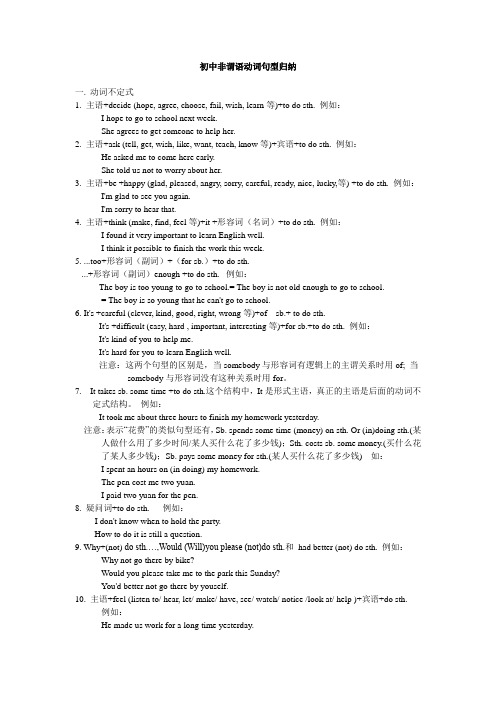
初中非谓语动词句型归纳一.动词不定式1. 主语+decide (hope, agree, choose, fail, wish, learn等)+to do sth. 例如:I hope to go to school next week.She agrees to get someone to help her.2. 主语+ask (tell, get, wish, like, want, teach, know等)+宾语+to do sth. 例如:He asked me to come here early.She told us not to worry about her.3. 主语+be +happy (glad, pleased, angry, sorry, careful, ready, nice, lucky,等) +to do sth. 例如:I'm glad to see you again.I'm sorry to hear that.4. 主语+think (make, find, feel等)+it +形容词(名词)+to do sth. 例如:I found it very important to learn English well.I think it possible to finish the work this week.5. ...too+形容词(副词)+(for sb.)+to do sth....+形容词(副词)enough +to do sth. 例如:The boy is too young to go to school.= The boy is not old enough to go to school.= The boy is so young that he can't go to school.6. It's +careful (clever, kind, good, right, wrong等)+of sb.+ to do sth.It's +difficult (easy, hard , important, interesting等)+for sb.+to do sth. 例如:It's kind of you to help me.It's hard for you to learn English well.注意:这两个句型的区别是,当somebody与形容词有逻辑上的主谓关系时用of; 当somebody与形容词没有这种关系时用for。
最全的非谓语动词知识点总结
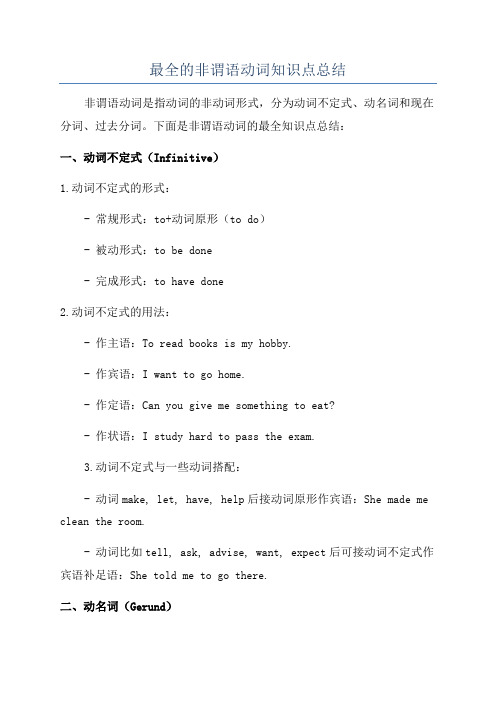
最全的非谓语动词知识点总结非谓语动词是指动词的非动词形式,分为动词不定式、动名词和现在分词、过去分词。
下面是非谓语动词的最全知识点总结:一、动词不定式(Infinitive)1.动词不定式的形式:- 常规形式:to+动词原形(to do)- 被动形式:to be done- 完成形式:to have done2.动词不定式的用法:- 作主语:To read books is my hobby.- 作宾语:I want to go home.- 作定语:Can you give me something to eat?- 作状语:I study hard to pass the exam.3.动词不定式与一些动词搭配:- 动词make, let, have, help后接动词原形作宾语:She made me clean the room.- 动词比如tell, ask, advise, want, expect后可接动词不定式作宾语补足语:She told me to go there.二、动名词(Gerund)1.动名词的形式:- 动词原形+ing(doing)2.动名词的用法:- 作主语:Swimming is good for health.- 作宾语:I enjoy reading books.- 作表语:His job is teaching English.- 作定语:The running water sounds relaxing.- 作状语:I walked home, singing songs.3.动名词与一些动词搭配:- 动词stop, finish, keep, mind后接动名词作宾语:He finished reading the book.- 动词enjoy, dislike, mind后接动名词作宾语:I enjoy swimming.三、现在分词(Present Participle)1.现在分词的形式:- 原形+ing(doing)2.现在分词的用法:- 作定语:The crying baby needs attention.- 作状语:He left the party, feeling disappointed.3.现在分词与一些动词搭配:- 动词keep, catch, find后接现在分词作宾补:I caught him stealing my money.- 动词see, hear, notice后接现在分词作宾补:I saw him walking in the park.四、过去分词(Past Participle)1.过去分词的形式:- 动词的过去分词形式(done)2.过去分词的用法:- 用于完成时态:I have finished my homework.- 用于被动语态:The book was written by him.3.过去分词与一些动词搭配:- 动词have, has, had, get, be等后接过去分词构成完成时态:He has eaten breakfast.- 动词make, let, have, get后接过去分词构成被动语态:She was made to clean the room.。
常见非谓语动词最全总结
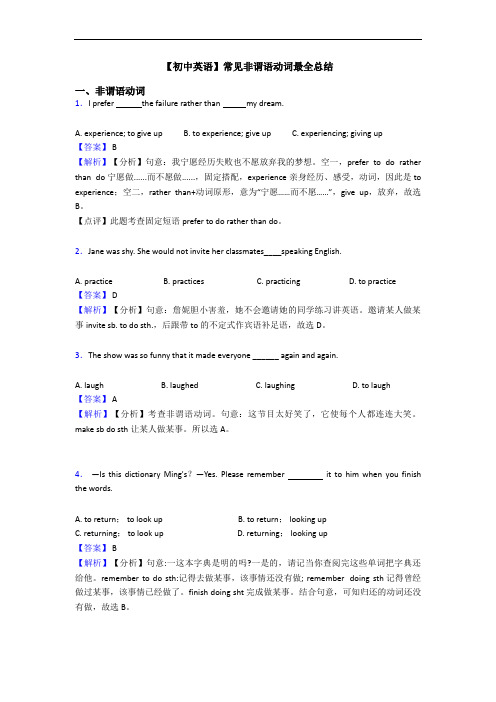
【初中英语】常见非谓语动词最全总结一、非谓语动词1.I prefer the failure rather than my dream.A. experience; to give upB. to experience; give upC. experiencing; giving up【答案】 B【解析】【分析】句意:我宁愿经历失败也不愿放弃我的梦想。
空一,prefer to do rather than do宁愿做......而不愿做......,固定搭配,experience亲身经历、感受,动词,因此是to experience;空二,rather than+动词原形,意为“宁愿……而不愿……”,give up,放弃,故选B。
【点评】此题考查固定短语prefer to do rather than do。
2.Jane was shy. She would not invite her classmates____speaking English.A. practiceB. practicesC. practicingD. to practice【答案】 D【解析】【分析】句意:詹妮胆小害羞,她不会邀请她的同学练习讲英语。
邀请某人做某事invite sb. to do sth.,后跟带to的不定式作宾语补足语,故选D。
3.The show was so funny that it made everyone ______ again and again.A. laughB. laughedC. laughingD. to laugh【答案】 A【解析】【分析】考查非谓语动词。
句意:这节目太好笑了,它使每个人都连连大笑。
make sb do sth让某人做某事。
所以选A。
4.—Is this dictionary Ming's?—Yes. Please remember it to him when you finish the words.A. to return; to look upB. to return; looking upC. returning; to look upD. returning; looking up【答案】 B【解析】【分析】句意:一这本字典是明的吗?一是的,请记当你查阅完这些单词把字典还给他。
初中非谓语动词最全总结

非谓语动词总结非谓语动词:即,在句子中除了充当谓语以外成分的词。
它可以分为动名词,动词不定式,分词。
初中着重讲前两种。
一.后面可跟动词的ing形式的情况1.动词:finish doing sth.完成做某事;enjoy doing sth. 喜欢做某事;practice doing sth. 练习做某事;imagine doing,想象做某事;avoid doing sth.避免做某事;consider doing sth.考虑做某事;suggest doing sth.建议做某事;mind doing sth.介意做某事;keep doing sth.持续做某事2.固定短语:feel like doing sth.喜欢做某事;be busy doing sth.忙于做某事;be worth doing 值得做某事;spend time (in) doing sth.花费时间(金钱)做某事;have difficult/trouble in doing sth做某事有困难;have fun doing.做某事高兴3.介词后(on, in, of, about, at, with, without, for, from, up, by等)如:be good at doing sth.;thank you for doing sth.;give up doing sth.;stop sb. from doing sth.;do well in doing sth.;be afraid of doing sth.;be interested in doing sth.;be proud of;instead of;be fond of4.to作介词的情况look forward to doing sth期望做某事;prefer doing sth. to doing sth与…相比较更喜欢…;pay attention to doing 注意做某事;be/get used to doing sth.习惯于做某事;make a contribution to为…做贡献二.后面可跟动词的不定式形式的情况1.动词:agree to do同意去做;afford to do买得起;decide to do 决定去做某事;hope to do希望去做;wish to do希望去做;fail to do 做某事失败去;plan to do打算去做;pretend to do假装去做;refuse to do拒绝去做;would like to do想要去做;want to do想要去做某事;learn to do 学做;prefer to do sth. 喜欢(爱)做某事;sb. seem to do sth好像做某事;want/would like to do sth. 想做……;used to do sth. 过去常做某事2.句型.allow sb. to do sth. 允许某人去做某事asked sb. (not) to do sth. 叫某人做事某事(叫某人不要去做某事)tell sb. (not) to do sth. 叫某人去(不要)做某事follow sb. to do sth. 跟随某人去做某事get sb. to do sth. 让某人做某事warn sb. (not) to do sth. 警告某人做某事(或不要做某事)be amazed to do sth. 对做某事感到惊讶be afraid to do sth. 害怕做某事be excited to do sth. 对做……感到兴奋be frightened to do sth. 害怕去做某事be glad/happy to do sth. 高兴去做某事be/get ready to do sth.准备做某事be sorry to do sth. 对做某事感到抱歉be surprised to do sth. 对做某事感到惊奇can’t wait to do sth. 迫不急待地去做某事get/have a chance to do sth. 得到一个做某事的机会It’s + a dj.+(for sb.) to do sth. 做某事(对某人来说)怎么样It’s +adj. +(of sb.) to do sth.It takes sb. some time/money to do sth. 花费某人多长时间做某事It’s best for sb. to do sth. 对某人来说做某事是最好的It’s time for sb. to do sth. 是某人做某事的时候了too…(for sb.) to …太…以致不能… =not… enough to do =so…that prefer to do sth. rather than do sth. 宁愿……而不愿……(常考)something to eat/drink 一些吃/喝的东西(动词不定式放在something等后)Sth. is hard/difficult/easy to do 做好某事很难/容易take turns to do sth. 轮流做……There is no time (for sb. ) to do sth. 对(某人来说)没时间做某事了There is no need (for sb.) to do sth. 对某人来说没必要做某事try/do one’s best to do sth. 尽力去做某事3.动词不定式与疑问代词和疑问副词的连用。
初中非谓语动词的学习要点
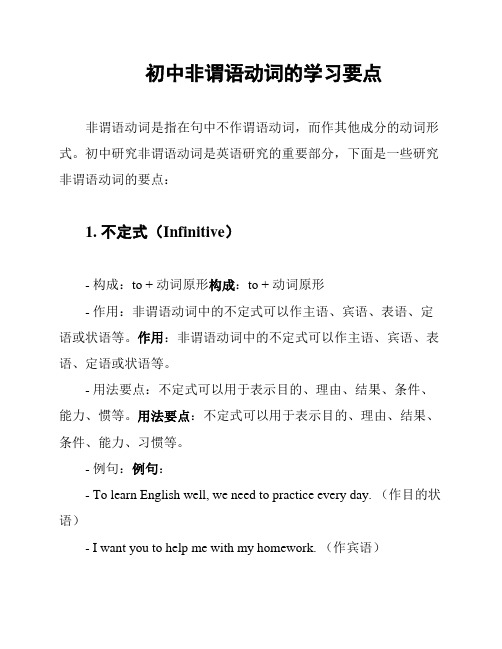
初中非谓语动词的学习要点非谓语动词是指在句中不作谓语动词,而作其他成分的动词形式。
初中研究非谓语动词是英语研究的重要部分,下面是一些研究非谓语动词的要点:1. 不定式(Infinitive)- 构成:to + 动词原形构成:to + 动词原形- 作用:非谓语动词中的不定式可以作主语、宾语、表语、定语或状语等。
作用:非谓语动词中的不定式可以作主语、宾语、表语、定语或状语等。
- 用法要点:不定式可以用于表示目的、理由、结果、条件、能力、惯等。
用法要点:不定式可以用于表示目的、理由、结果、条件、能力、习惯等。
- 例句:例句:- To learn English well, we need to practice every day. (作目的状语)- I want you to help me with my homework. (作宾语)2. 动名词(Gerund)- 构成:动词原形 + -ing构成:动词原形 + -ing- 作用:动名词在句中可以作主语、宾语、表语、定语或状语等。
作用:动名词在句中可以作主语、宾语、表语、定语或状语等。
- 用法要点:动名词可用作表示动作或状态的名词,常用于表示喜好、兴趣、能力等。
用法要点:动名词可用作表示动作或状态的名词,常用于表示喜好、兴趣、能力等。
- 例句:例句:- Swimming is a good exercise. (作主语)- She enjoys reading books. (作宾语)- His favorite hobby is playing basketball. (作表语)3. 分词(Participle)- 构成:动词的-ing 形式(现在分词)或-ed 形式(过去分词)构成:动词的-ing 形式(现在分词)或-ed 形式(过去分词)- 作用:分词可以作定语、状语或补语等。
作用:分词可以作定语、状语或补语等。
- 用法要点:分词用于修饰名词或代词,常用于描述原因、方式、时间或状态等。
初中非谓语动词最全总结
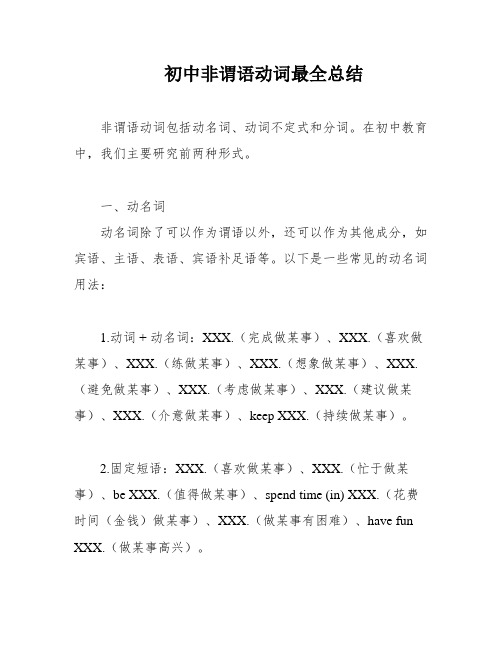
初中非谓语动词最全总结非谓语动词包括动名词、动词不定式和分词。
在初中教育中,我们主要研究前两种形式。
一、动名词动名词除了可以作为谓语以外,还可以作为其他成分,如宾语、主语、表语、宾语补足语等。
以下是一些常见的动名词用法:1.动词 + 动名词:XXX.(完成做某事)、XXX.(喜欢做某事)、XXX.(练做某事)、XXX.(想象做某事)、XXX.(避免做某事)、XXX.(考虑做某事)、XXX.(建议做某事)、XXX.(介意做某事)、keep XXX.(持续做某事)。
2.固定短语:XXX.(喜欢做某事)、XXX.(忙于做某事)、be XXX.(值得做某事)、spend time (in) XXX.(花费时间(金钱)做某事)、XXX.(做某事有困难)、have fun XXX.(做某事高兴)。
3.介词后(on。
in。
of。
about。
at。
with。
without。
for。
from。
up。
by等):be good at doing sth.(擅长做某事)、thank you for doing sth.(感谢做某事)、give up XXX.(放弃做某事)、XXX.(阻止某人做某事)、do well in doing sth.(做某事做得好)、XXX.(害怕做某事)、be XXX.(对做某事感兴趣)、be proud of(以…为自豪)、instead of(代替)、be fond of(喜爱)。
4.to作介词:look forward to doing sth.(期望做某事)、XXX.(与…相比较更喜欢…)、pay n to doing sth.(注意做某事)、be/get used to doing sth.(惯于做某事)、XXX(为…做贡献)。
二、动词不定式动词不定式通常作为动词的宾语、宾语补足语、主语、表语、定语等。
以下是一些常见的动词不定式用法:1.动词 + 不定式:decide to do sth.(决定做某事)、want to do sth.(想做某事)、XXX.(希望做某事)、try to do sth.(尝试做某事)、fail to do sth.(未能做某事)、XXX.(拒绝做某事)、promise to do sth.(承诺做某事)、manage to do sth.(设法做某事)。
初中英语语法 非谓语动词总结

初中英语语法非谓语动词总结非谓语动词主要包括不定式、动名词和现在分词。
为了区分这三种不同的非谓语动词的用法和含义,我们将分别从三种非谓语动词在句子中做主语、宾语、宾语补足语、定语、状语、表语以及一些特殊结构句型等角度来区分其用法和细微含义。
1.不定式和动名词作主语的区别(1)动名词作主语通常表示抽象动作;而不定式作主语表示具体动作。
Smoking is prohibited(禁止)here.这里禁止抽烟。
(抽象)It is not very good for you to smoke so much.你抽这么多烟对你身体很不好。
(具体)(2)动名词作主语时,通常用以表示一件已知的事或经验。
不定式短语通常用来表示一件未完成的事或目的。
Climbing mountains is interesting.爬山很有趣。
(经验)Driving a car during the rush hour is tiring.在高峰时刻开车令人厌烦。
(经验) (3)不定式做主语,一般用it当形式主语,把作主语的不定式短语后置。
It took me only five minutes to finish the job.2.不定式、动名词和分词作表语的区别(1)不定式作表语1)不定式作表语一般表示具体动作,特别是表示将来的动作。
To do two things at a time is to do neither.--次做两件事等于未做。
What I would suggest is to start work at once.我的建议是立刻开始干。
2)如果主语是不定式(表示条件),表语也是不定式(表示结果)。
To see is to believe.百闻不如一见。
To work means to earn a living.工作就是为了生活。
3)如果主语是以aim,duty,hope,idea,happiness,job,plan,problem,purpose,thing,wish等为中心的名词,或以what引导的名词性从句,不定式作表语是对主语起补充说明作用。
初中非谓语动词全总结
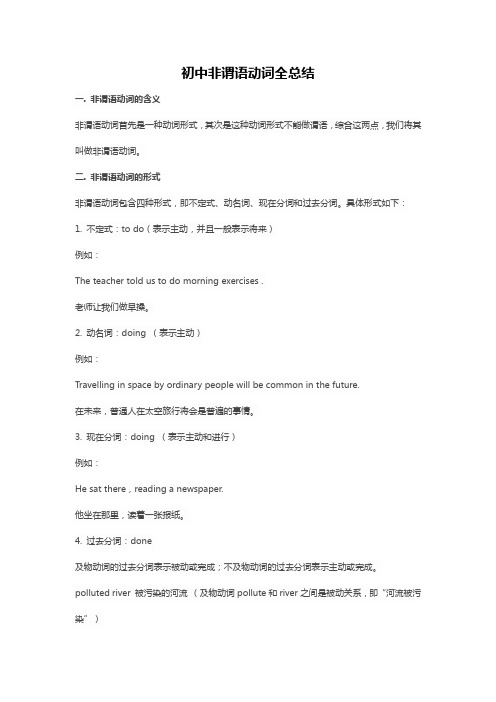
初中非谓语动词全总结一. 非谓语动词的含义非谓语动词首先是一种动词形式,其次是这种动词形式不能做谓语,综合这两点,我们将其叫做非谓语动词。
二. 非谓语动词的形式非谓语动词包含四种形式,即不定式、动名词、现在分词和过去分词。
具体形式如下:1. 不定式:to do(表示主动,并且一般表示将来)例如:The teacher told us to do morning exercises .老师让我们做早操。
2. 动名词:doing (表示主动)例如:Travelling in space by ordinary people will be common in the future.在未来,普通人在太空旅行将会是普遍的事情。
3. 现在分词:doing (表示主动和进行)例如:He sat there,reading a newspaper.他坐在那里,读着一张报纸。
4. 过去分词:done及物动词的过去分词表示被动或完成;不及物动词的过去分词表示主动或完成。
polluted river 被污染的河流(及物动词pollute和river之间是被动关系,即“河流被污染”)fallen leaves 落叶(不及物动词fall和leaves之间是主动关系,即“叶子落下来”)注意:非谓语动词本身不能表示现在和过去。
非谓语动词表示进行和将来是相对于谓语动作来说的:和谓语动作同时发生表示进行;发生在谓语动作之后表示将来三. 非谓语动词的作用非谓语动词除去不能做谓语之外,其它所有成分都可以做。
具体如下。
1. 不定式:做主语、宾语、表语、定语、状语和补语。
To learn a foreign language is difficult .(作主语)学会一门外语是很难的。
It’s easy to see their aunt.(作真正主语,it做形式主语)很容易见到他们的姑姑。
Tom wanted to have a cup of beer.(作宾语)汤姆想要喝杯啤酒。
- 1、下载文档前请自行甄别文档内容的完整性,平台不提供额外的编辑、内容补充、找答案等附加服务。
- 2、"仅部分预览"的文档,不可在线预览部分如存在完整性等问题,可反馈申请退款(可完整预览的文档不适用该条件!)。
- 3、如文档侵犯您的权益,请联系客服反馈,我们会尽快为您处理(人工客服工作时间:9:00-18:30)。
非谓语动词总结
一.后面可跟动词的ing形式的情况
1.动词:finishdoingsth.完成做某事;enjoydoingsth.喜欢做某事;practicedoingsth.练习做某事;imagine doing,想象做某事;avoid doing sth.避免做某事;considerdoingsth.考虑做某事;suggestdoingsth.建议做某事;minddoingsth.介意做某事;keepdoing sth.持续做某事
doing值得做某事;spendtime(in)doingsth.花费时间(金钱)做某事;havedifficult/trouble in doing sth做某事有困难;have fun doing.做某事高兴
3.介词后(on, in, of, about, at, with, without, for, from, up, by等)
如:be good at doing sth.;thank you for doing sth.;give up doing sth.;stop sb.from doing sth.;do well in doing sth.;be afraid of doing sth.;be interested indoing sth.;be proud of;instead of;be fond of
4.to作介词的情况lookforwardtodoingsth期望做某事;
preferdoingsth.todoingsth与…相比较更喜欢…;pay attention to doing注意做某事;be/get used to doingsth.习惯于做某事;make a contribution to为…做贡献
二.后面可跟动词的不定式形式的情况
1.动词:agree todo同意去做;afford to do买得起;decide todo决定去做某事;hopeto do希望去做;wish to do希望去做;fail to do做某事失败去;plan to do打算去做;pretend to do假装去做;refuse to do拒绝去做;would like to do 想要去做;want todo想要去做某事;learntodo学做;prefertodosth.喜欢(爱)做某事;sb.seemtodo sth好像做某事;want/would like to do sth.想做……;used to do sth.过去常做某事
2.句型.
allow sb. to do sth.允许某人去做某事
asked sb. (not) to do sth.叫某人做事某事(叫某人不要去做某事)
tell sb. (not) to do sth.叫某人去(不要)做某事
follow sb. to do sth.跟随某人去做某事
get sb. to do sth.让某人做某事
warn sb. (not) to do sth.警告某人做某事(或不要做某事)
be amazed to do sth.对做某事感到惊异
be afraid to do sth.害怕做某事
be excited to do sth.对做……感到兴奋
be frightened to do sth.害怕去做某事
be glad/happy to do sth.高兴去做某事
be/get ready to do sth.准备做某事
be sorry to do sth.对做某事感到抱歉
be surprised to do sth.对做某事感到惊讶
can’t wait to do sth.迫不急待地去做某事
get/have a chance to do sth.得到一个做某事的机会
It’s + adj.+(for sb.) to do sth.做某事(对某人来说)怎么样
It’s+adj. +(of sb.) to do sth.
It takes sb. some time/money to do sth.花费某人多长时间做某事(常考)It’s best for sb. to do sth.对某人来说做某事是最佳的
It’s time for sb. to do sth.是某人做某事的时候了
too…(for sb.) to …太……以致不能……==not…enough to do
prefer to do sth. rather than do sth.宁愿……而不愿……(常考)
something to eat/drink一些吃/喝的东西(词不定式放在something等后修饰这些Sth. is hard/difficult/easy to do做好某事很难/简易
take turns to do sth.轮流做……
There is no time (for sb. ) to do sth.对(某人来说)没时间做某事了
There is no need (for sb.) to do sth.对某人来说没必要做某事
try/do one’s best to do sth.尽力去做某事
三、后既能跟不定式也能跟动名词的情况:
1、后加不定式或动名词意思相近的动词
有些动词接doing和to do意义相近像like(喜欢),love(喜欢),hate(憎恨),prefer(宁可),begin(开始),start(开始),continue(继续)。
如:等词后加不定式或动名词区别不大:如:liketo do表示想要做某一详尽的动作like dong表示大凡或抽象的多次动作它们在实际使用中区别很小。
2、后加不定式或动名词区别较大的动词:
remember to do(记住去做) remember doing(记得做过)
forget to do(忘记去做) forget doing(忘记做过)
try to do(设法做) try doing(试着做)
go on to do(接着做另一事) go on doing(继续做同一事)
stop to do(停下来去做) stop doing(停止做)
can’t help to do(不能帮助做) can’t help doing(情不自禁做)
四、后跟不带to的不定式(动词原形)的情况。
1.在感官动词和使役动词后
feel,hear,listen to,watch,look at,see,notice,make,let,have等后跟动词不定式作宾语补足语时应省去不定式符号to。
注意:将此句改为被动句时,省去的不定式符号to应加上。
在动词help后跟不定式作宾语或宾语补足语时,既可带to,也可不带to。
2.助动词或情态动词后:
do, did, does, will, shall, would, should, can, may, must等后面接不带to的动词不定式。
3.某些不变句型中
1)Will(Would)you please(not)...?请(不要)做某事好吗?
2)had better最佳做某事
3)Why not...?为何不做某事
4)wouldrather(not)...宁可(不);宁愿(不)此句型也可以扩展成:wouldrather...than...=would...rather than...。
5)在祈使语气(或口语)中。
五.既可跟动词原形又可跟动词ing形式的情况。
see,watch,hear等动词,后面既可跟原形又可跟动名词形式,跟原形时表示做过或经常做,跟动名词时表示正在做。
see/watch sb. do sth.看到某人做过(经常做)某事see/watch sb. doing sth.看到某人正在做某事hear sb. do sth.听到某人做过(经常做)某事hear sb. doing sth.听到某人正在做某事。
